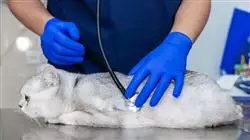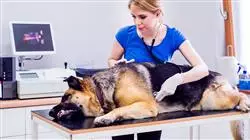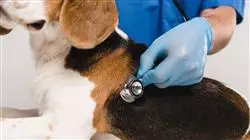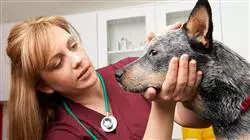University certificate
The world's largest faculty of veterinary medicine”
Description
The knowledge acquired through this program provides the student with a comprehensive, practical and updated education in a discipline that is fundamental in the practice of the veterinary profession"

Quality-based internal medicine allows for work to be combined with other specialties, which is often a high priority, given that a large number of pathologies result in Cardiorespiratory, Oncological and Neurological Pathologies in Small Animals manifestations, among many others.
The Cardiorespiratory, Oncological and Neurological Pathologies in Small Animals often suffer from alterations that, if poorly diagnosed or treated, can be life-threatening. This makes the study and comprehension of the behavior of these systems play a relevant role in small animal veterinary clinics, as does the management of various related pathologies.
Likewise, neurological alterations in companion animals are a very frequent reason for consultation Due to the great variety of clinical manifestations that can emerge, it is crucial to know how to perform a correct neurological examination in order to verify that it is in fact a neurological problem.
On the other hand, cancer treatments for animals do not always offer possibilities for a cure; however, the veterinarian must be aware of the therapeutic options available for consideration. Neoplastic diseases are increasingly being considered as chronic. That is why early and accurate identification or diagnosis of an animal with cancer is essential, especially as prognosis varies significantly.
This program will explain how to interpret the clinical signs of patients and how to make a systematic, evidence-based diagnosis in which value is given both to diagnostic tests as well as the veterinarian's knowledge of the corresponding interpretation and correlation with clinical signs.
The teaching staff of this postgraduate diploma Degree is made up of specialists from within different areas of internal medicine with extensive clinical experience. Several of these faculty members have received accreditation as specialists in different fields such as cardiology, ophthalmology, diagnostic imaging, dermatology and oncology, and have collaborated together in veterinary specialty centers. In addition to providing quality clinical work, some of these experts actively participate in various research projects parallel to their teaching and clinical activities.
Each topic is accompanied by clinical cases that aim to incorporate the knowledge conveyed and includes activities that will allow students to assess their progress"
This postgraduate diploma in Cardiorespiratory, Oncological and Neurological Pathologies in Small Animals contains the most complete and up-to-date educational program on the market. Its most important features include:
- Case studies presented by experts in Cardiorespiratory, Oncological and Neurological Pathologies in Small Animals
- Graphic, schematic, and practical contents to provide scientific and practical information on those disciplines that are essential for professional development
- Latest developments in Cardiorespiratory, Oncological and Neurological Pathologies in Small Animals
- Practical exercises where the self-assessment process can be carried out to improve learning
- Special focus on innovative methodologies in Cardiorespiratory, Oncological and Neurological Pathologies in Small Animals
- Theoretical lessons, questions to the expert, debate forums on controversial topics, and individual reflection work
- Content that is accessible from any fixed or portable device with an Internet connection
Upon completion of the program, students will have obtained knowledge that is essential for professional practice, whether they choose to exercise in a clinical, academic or research context"
It includes, in its Teaching staff, Professionals belonging to the veterinary field, who pour into this training the experience of their work, in addition to recognized Specialists from Reference Societies and Prestigious Universities.
The multimedia content, developed with the latest educational technology, will provide the professional with situated and contextual learning, i.e., a simulated environment that will provide immersive learning programmed to train in real situations.
This program is designed around Problem-Based Learning, whereby the professional must try to solve the different professional practice situations that arise throughout the program. For this purpose, the professional will be assisted by an innovative interactive video system created by renowned and experienced experts in postgraduate diploma in Cardiorespiratory, Oncological and Neurological Pathologies in Small Animals.
Combine your studies with professional work while increasing your knowledge in this field with this highly rigorous scientific training"

Specialize in a sector with a strong demand for professionals with this high-level program designed by experts in the field"
Objectives
The postgraduate diploma in Cardiorespiratory, Oncological and Neurological Pathologies in Small Animals is oriented towards facilitating the performance of the veterinary professional with the latest advances and most innovative treatments in the field.

This postgraduate diploma is unique in its category, which will allow students to acquire specialized knowledge and thus be able to offer a high-quality internal medicine service to clients and patients"
General Objectives
- Understand the physiology of the immune system
- Identify clinical signs associated with cardiorespiratory diseases as well as decision-making when selecting diagnostic tests
- Possess adequate knowledge and decision-making skills when dealing with pharmacological therapeutics applied to these organ systems
- Recognize most frequent neoplasms in pet animals
- Identify main cell lines at the cytological level
- Establish correct diagnostic protocol according to anamnesis and physical examination of animal
- Elaborate most appropriate treatment according to nature of tumor and physical condition of patient
- Consolidate basic concepts related to neuroanatomy
- Be able to perform a complete neurological examination and localize a lesion, based on findings
- Elaborate differential diagnosis according to history, anamnesis and neurological examination
- Establish diagnostic protocol taking into account findings of neurological examination
Specific Objectives
Module 1. Cardiorespiratory Disorders
- Analyze and describe pathophysiological mechanisms of different diseases
- Identify the different diagnostic tests available for these two organ systems
- Adapt pharmacological therapy to specific condition of cardiorespiratory patient
- Identify clinical symptomatology of different cardiorespiratory diseases
- Accurately recognize different pulmonary radiographic patterns
- Interpret echocardiographic images
- Propose a methodology for the treatment of different cardiorespiratory pathologies
- Establish management procedure for patient with heart failure or acute dyspnea
Module 2. Oncology
- Recognize main oncological emergencies
- Identify main differences between mammary tumors in bitches and female cats
- Become familiar with the most common cytostatics and their management when administering chemotherapy
- Know how to manage an initial oncology consultation with owners
- Identify paraneoplastic syndromes and find a means of approach
- Assess different therapeutic options depending on type of neoplasm
- Propose diagnostic protocol that allows for adequate tumor staging
- Establish best therapeutic option(s) once stage of tumor is determined
Module 3. Neurology
- IDetermine whether lesion is intracranial or extracranial, based on neurological examination
- Examine main differences between central and peripheral SNs
- Establish a diagnostic protocol for seizure disorders
- Recognize a status epilepticus and know how to proceed with treatment
- Identify typical signs of upper and lower motor neuron syndrome
- Follow correct treatment guidelines for head injuries and establish prognosis
- Know basics of neuro-ophthalmology and know how to apply clinically

Join one of the largest online universities in the world”
Postgraduate Diploma in Cardiorespiratory, Oncologic and Neurologic Pathologies in Small Animals
Cardiorespiratory, oncological and neurological pathologies are common in small animals such as dogs and cats. In this sense, it is important for veterinarians to know how to diagnose and treat these diseases to ensure proper medical care, which improves the animals' quality of life. If you want to obtain the necessary knowledge to specialize in this field, the Postgraduate Diploma in Cardiorespiratory, Oncological and Neurological Pathologies in Small Animals created by TECH Global University is ideal for you. Here, you will have a virtual methodology, complemented with high-level educational resources. During the course of the training, you will be continuously accompanied by experts in the area, who will guide you to obtain a progressive and efficient learning. Through the lessons of the syllabus, you will delve into the anatomy and physiology of the cardiovascular, respiratory and nervous systems of animals.
Become an expert in the care of cardiorespiratory, oncological and neurological pathologies in small animals
.
At TECH we have the largest Veterinary Faculty, from which we provide you with the necessary tools to become an expert. By enrolling in this Postgraduate Diploma, you will analyze numerous case studies, which will allow you to obtain an immersive learning that will be of great use for your daily work. Throughout the thematic modules, you will learn about the ethical and legal aspects of animal health care, as well as the most common pathologies, including heart failure, chronic obstructive pulmonary disease (COPD), cancer and neurological diseases. This will allow you to diagnose, treat and manage these diseases effectively, using the most advanced techniques and tools available. Thanks to this, you will be able to make important decisions in critical and emergency situations.







